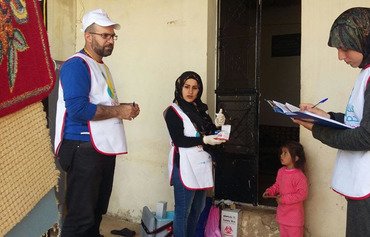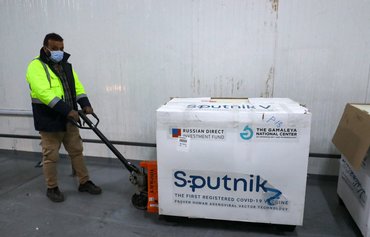The EU is increasing its commitment to strengthen Lebanon's healthcare system to 19 million euros ($21.5 million) in 2019 to help the most vulnerable secure access to medications, vaccines and essential medical supplies.
The increase in funding, from the EU Regional Trust Fund in Response to the Syrian Crisis (the Madad Fund), is part of a 173 million euro ($196 million) EU support package to strengthen the health sector.
The funds will be used to help meet the basic health needs of Lebanese citizens and Syrian refugees during a time of great pressure on the system, the EU said.
The increase in EU funding, announced December 18th, "allows us to maintain the health standards we have set", said Minister of Public Health Ghassan Hasbani.
![Minister of Public Health Ghassan Hasbani speaks at a December 18th press conference where the EU announced additional funding to support Lebanon's healthcare system. [Nohad Topalian/Al-Mashareq]](/cnmi_am/images/2019/01/04/16014-Lebanon-minister-conference-600_384.jpg)
Minister of Public Health Ghassan Hasbani speaks at a December 18th press conference where the EU announced additional funding to support Lebanon's healthcare system. [Nohad Topalian/Al-Mashareq]
This is especially critical "as Lebanon is facing a difficult situation brought on by the massive influx of refugees", he told Al-Mashareq.
The ministry has sought to prevent and control disease through vaccination and pre-emptive treatment, he said.
"We ask donors to continue to provide medicine, vaccines, expertise and infrastructure to enable us to respond," Hasbani said.
The ministry has "developed an integrated system for the health sector", starting with primary healthcare for the poorest segments of the population, he said, adding that this is being expanded with the support of the World Bank.
"The pre-emptive measures and dispensation of vaccines at healthcare centres throughout Lebanon help reduce the cost of hospitalisation," he said.
The financial support extended by the EU also "supports healthcare centres and allows for the training of doctors and nurses", Hasbani added.
'High rates of success'
"Our support to the health sector is one of the largest programmes that we have been running for years with the Ministry of Public Health to strengthen the sector," said EU Ambassador Christina Lassen.
The EU has helped to rehabilitate "more than 230 healthcare centres and a number of hospitals, as well as train doctors and nurses and provide medicine to the needy and vaccines for children", she told Al-Mashareq.
"The EU initially allocated 12 million euros ($13.6 million) for 2019, but subsequently raised it to 19 million euros ($21.5 million), an increase of 7 million euros ($8 million) to be allocated to the Ministry of Public Health and the health infrastructure as an investment in the sector," she said.
"UNICEF's partnership with the EU, the Ministry of Public Health and local organisations affiliated with the World Health Organisation (WHO) has ensured every needy child has access to high-quality vaccines and medicine," said UNICEF representative to Lebanon Tanya Chapuisat.
"The EU has achieved high rates of success in saving children's lives and strengthening systems and communities in order to build a better future for children," she told Al-Mashareq.
Over 1.2 million vaccines
The new financial support from the EU "allowed us to obtain all the medicine and vaccines we need for 2019 and to enhance the capabilities of the Ministry of Public Health", Chapuisat said.
"In 2018, UNICEF supplied more than 1.2 million vaccines to all health care centres," she added.
The new support "allows us to add to our stockpiles to continue on with the monthly child vaccination campaigns", she said.
The EU support ensures the good quality of health services in Lebanon, said WHO representative to Lebanon Iman Shankiti.
"The support will also help in terms of providing early detection of diseases and health risks, enhancing the capabilities of the health system and ensuring that no patient in need of healthcare is abandoned," she told Al-Mashareq.
The funding "will allow us to provide chronic disease medicines to 92,000 Lebanese [and Syrian] refugees for a period of three years, starting in 2019", she said.

![Minister of Public Health Ghassan Hasbani tours the Central Drug Warehouse at Karantina Hospital with EU Ambassador Christina Lassen. [Nohad Topalian/Al-Mashareq]](/cnmi_am/images/2019/01/04/16013-Lebanon-EU-warehouse-600_384.jpg)






